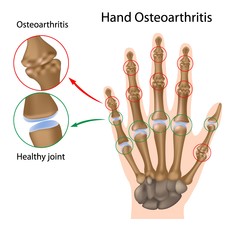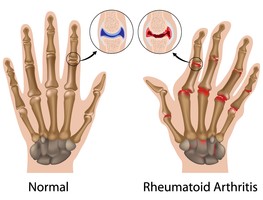

What is Arthritis?
Arthritis is the inflammation of one or more of your joints. With arthritis, the diseased joint can swell and become inflamed. The inflammation can cause lasting damage and may lead to pain and possible restriction in motion. There are two types of arthritis: osteoarthritis (or degenerative arthritis) and rheumatoid arthritis.
Common Causes Osteoarthritis can be caused by the natural aging process and the wear and tear/breakdown on the articular cartilage. Articular cartilage is an elastic tissue that covers bones that make up your joint. As cartilage deteriorates in the joint, bones begin to rub against each other causing stiffness and pain. Cartilage wears away over time leading to a rough surface causing painful joint movement. There are many factors that may play a role in the progression of osteoarthritis. These include: age, obesity, injury or overuse, genetics or heredity and muscle weakness.
Osteoarthritis can be caused by the natural aging process and the wear and tear/breakdown on the articular cartilage. Articular cartilage is an elastic tissue that covers bones that make up your joint. As cartilage deteriorates in the joint, bones begin to rub against each other causing stiffness and pain. Cartilage wears away over time leading to a rough surface causing painful joint movement. There are many factors that may play a role in the progression of osteoarthritis. These include: age, obesity, injury or overuse, genetics or heredity and muscle weakness.

Rheumatoid arthritis is a progressive disease, which means that without proper treatment, symptoms like inflammation can lead to permanent joint damage. As this joint damage progresses, it can cause deformity, disability, loss of function, and an overall decrease in one’s quality of life. One may have difficulty doing activities that were once easy. These activities can range from small everyday tasks like buttoning a shirt, to responsibilities at home and work, to things you simply enjoy doing. However, there are ways to get a head start on preventing these long-term effects from having a major impact on one’s life and health.
Diagnosis
A physical examination and X-rays will help to determine the extent of the damage to the joint.
Treatments:
There are surgical and non-surgical treatment options available that focus on relieving symptoms and improving joint function.
Copyright © www.orthopaedics.win Bone Health All Rights Reserved